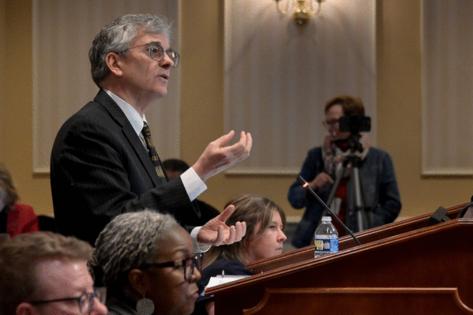Former secretary says he left Maryland's Department of Juvenile Services due to 'human rights abuses' in system
Published in News & Features
BALTIMORE — Former Department of Juvenile Services Secretary Vincent Schiraldi left his role in Gov. Wes Moore’s Cabinet earlier this month because Maryland perpetuated “human rights abuses” against young people caught up in the criminal justice system, he wrote in The Baltimore Sun’s opinion pages Thursday.
Doubling down on his insistence that he stepped down despite Moore saying he “ordered” the resignation, Schiraldi wrote that he left because of what he called the “draconian law” that automatically treats some juveniles as adults.
“My participation in this harmful farse left a stink on me that won’t soon wash off,” Schiraldi wrote.
Schiraldi’s striking condemnation of the system he sought to reform came after a sometimes tumultuous two-year run at the helm of Maryland’s juvenile corrections facilities and programs.
Though he was applauded by many advocates who sought a more rehabilitative approach to youth crime, Schiraldi met fierce resistance from Republican lawmakers, law enforcement and state prosecutors who said the system lacked oversight and accountability.
The Democratic governor had stood by Schiraldi and celebrated the progress made in an agency that he said was critically flawed when he took office in 2023. But his “patience was running low,” so he “ordered Secretary Schiraldi’s resignation after several lengthy conversations,” Moore said earlier this month.
Schiraldi acknowledged, also earlier in June, that he’d “become a bit of a lightning rod” and that he was proud of the progress he’d made but didn’t want to be a distraction. He said he told Moore’s office “some time ago” that he wanted to step away.
The op-ed he authored Thursday offers another motivation — the “main reason,” as Schiraldi describes it: He no longer wanted to be associated with Maryland’s habit of incarcerating young people in adult corrections facilities.
“[S]ince history doesn’t smile on people who say they were only following orders as they operationalized human rights abuses, I left, choosing to use my voice on the outside to push for change more vociferously than is appropriate for a departmental secretary,” he wrote.
Schiraldi’s frustration lay with the failed legislative efforts to give judges more authority in deciding whether youth should be tried in juvenile or adult court.
Under Maryland law, teenagers who are at least 16 years old and are alleged to have committed crimes like robbery, kidnapping, abduction, third-degree sexual offenses or possessing or selling a firearm are not tried in juvenile court. Children who are at least 14 years old and charged with an act that, for adults, would be punished with a life sentence are also not under the jurisdiction of juvenile court.
As a result, Schiraldi wrote, those young people are initially sent to adult jails, even though 85% of the cases are eventually dismissed or returned to juvenile court. He pointed to one case in which a 17-year-old sophomore in high school with “borderline intellectual functioning” was charged with misdemeanor gun possession in December, spent three weeks in an adult jail, six months in a juvenile facility and then saw his case dismissed last week.
Such cases create a more expensive process for the state and are a detriment to public safety, he wrote, citing research that notes how youth who are subjected to adult prosecution are more likely to reoffend and in more violent ways.
He put the blame on the Maryland General Assembly. Lawmakers should have passed legislation — supported by the Legislative Black Caucus, Attorney General Anthony Brown and a group of judges — that would have given the juvenile courts more jurisdiction.
That legislation was sponsored by Sen. Will Smith, a Montgomery County Democrat who chairs the committee where the legislation was introduced but never received a vote. Schiraldi’s agency testified in support of the bill — typically a sign that the governor’s administration supports the policy — while prosecutors like the Baltimore State’s Attorney’s Office testified against it.
“Maryland lawmakers repeatedly refused to budge on this costly, ineffective, and racially divisive approach, ignoring legislative proposals to do so year after year,” Schiraldi wrote.
The op-ed does not specifically reference Moore or the legislation he signed into law last year that increased penalties for younger children accused of certain crimes — a controversial change spurred by prosecutors’ criticisms and public outcry over youth crime.
--------------
©2025 The Baltimore Sun. Visit at baltimoresun.com. Distributed by Tribune Content Agency, LLC.







Comments